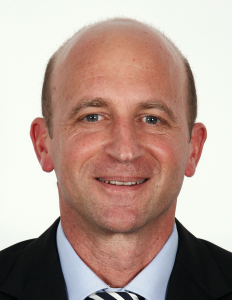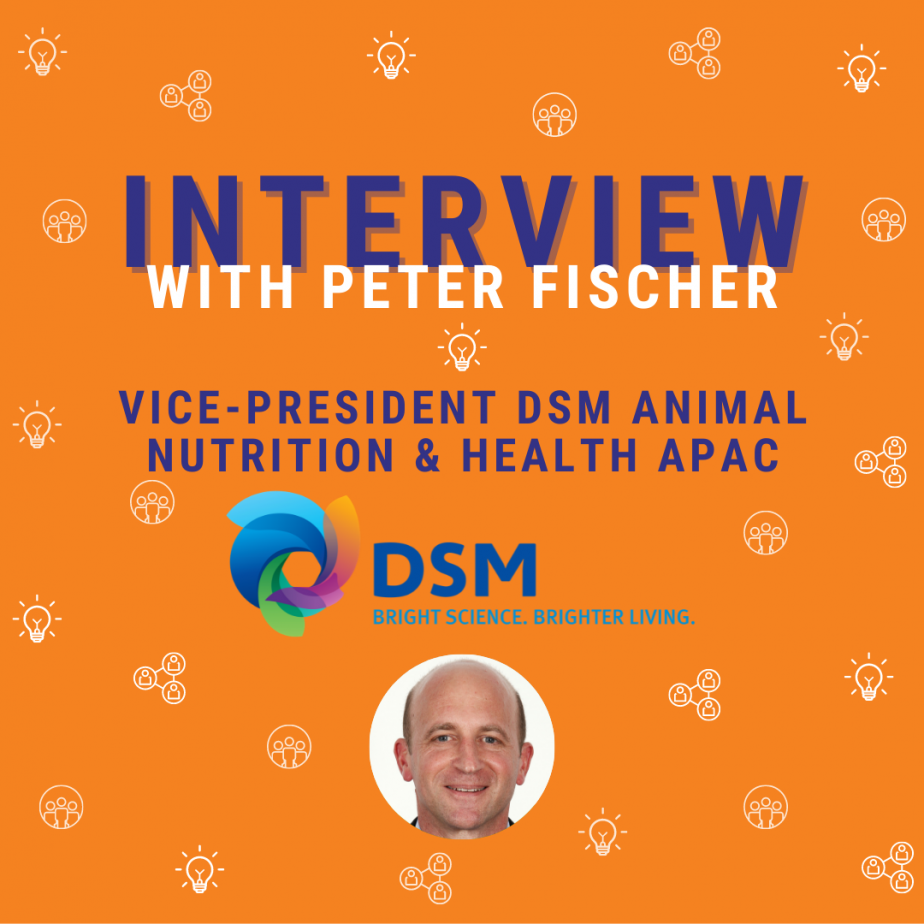
 Peter Fisher, Vice President, Animal Nutrition & Health, Asia Pacific, DSM
Peter Fisher, Vice President, Animal Nutrition & Health, Asia Pacific, DSM
Peter brings over 30 years of experience in animal nutrition and health and has been with DSM since 2002. He has worked across different markets such as Middle East, Africa and Europe to strategically enhance DSM’s offerings, planning, and executing capital investments including mergers and acquisitions. Peter is passionate about delivering science-based solutions to customers and has represented DSM in several conferences and industry bodies.
About DSM: Royal DSM is a purpose-led, performance-driven, global science-based company that delivers innovative business solutions across Nutrition, Health and Sustainable Living. We aim to marry scientific expertise and innovative power to help answer some of the world’s biggest and most pressing challenges, while supporting business growth and creating sustainable value for our customers, employees, shareholders, and society at large.
16 November 2020
- What were your biggest challenges in your career and what did you learn from them?
I’ve been fortunate enough to both be a part of and lead culturally diverse groups across different regions. That has undoubtedly been the most interesting and challenging aspect of my career. One thing that I would count as a major learning is to learn to listen actively and understand the local context. Active listening shows that you genuinely care about what your co-worker has to say which will in turn make them feel heard and included. It also lets you expand your perspective from a cultural standpoint especially if you work in a diverse team. During certain difficult moments in my career, I could turn to my mentors for guidance and I hope that my team members feel comfortable doing the same with me.
During one of my assignments we faced a significant currency devaluation in one of our markets, with strong recommendations to stop trading. However, together with the local team we decided to continue operating and for one reason only – our customers relied on us to support their businesses and ultimately, their communities’ livelihood. This decision was repaid many times over as we not only retained the business, but grew together with our customers. It again showed that loyalty & relationships still play such a key role in our business.
- Who is your role model with regards to leadership? What did you learn from her/him?
I believe that learning never stops, no matter what stage of your professional life you are at. I have worked with many inspiring people and leaders whom I consider as role-models throughout my career. Everyone has their own style of leadership, but the best role models are patient, understanding and empathetic. They allow you to make mistakes and learn from them. Difficult situations like the one that we are going through now reveal the importance of having empathy in a leader. A quality that I have adapted from my role-models is to be more empathetic towards my co-workers.
- What kind of leader are you?
I would like to believe that I am a very inclusive leader. I like to consult with my team on key issues to encourage inclusivity and get different perspectives from co-workers. Together, when we decide on a way forward, I like to execute our vision with passion and drive. I see it as my responsibility as a leader to inspire people to take risks and support them where needed, equipping them with the confidence and tools that can allow them to excel. I want them to feel that they can approach me for guidance without hesitation as I believe in creating an open and honest workplace.
Successful leaders today are people that surround themselves with the most talented and diverse people they can find, and provide this team with a compelling vision that focuses on the communities they serve and being custodians of limited resources. If we can do this well, being a successful enterprise becomes inevitable.
- What is the biggest culture difference in Singapore compared with SA?
That’s a tough one to answer. Both countries have culturally diverse populations. Singapore really prides itself on its diversity and drives the agenda to be successful and continue growing in the long-term.
I was quite fortunate in that I grew up on a South-African farm and early in my life got to understand and appreciate the responsibility and risks involved in producing food. Farmers are so often overlooked and we have little if any appreciation for the risk & uncertainty that they face in following their calling. It is with this background in mind that I come to work every day and hope that I am part of a group of inspired people that can bring solutions & products that will encourage future generations to also take up farming – it is for me still one of the most noble callings today.
- We all know DSM – but what does DSM produce here in the region?
Asia Pacific is a key region for innovation for DSM and is home to a large number of sites which enable us to deliver sustainable, scalable solutions across our focus domains across Nutrition, Health and Sustainable Living. Under Animal Health and Nutrition, we have products that range from vitamins to improve animal health, well-being and performance; to feed enzymes that meet the challenges of the global livestock production; and eubiotics that helps animals with increased nutrient absorption.
Singapore serves as the regional headquarters for DSM in Asia Pacific and is the home for two DSM sites:
- The first one is for HNH premix site which houses an Innovation Application Center
- The second one is Dyneema Tech Center. Dyneema is the first ever bio-based ultra-high molecular weight polyethylene fiber.
Additionally, we also partner with companies such as FoodInnovate which is a multi-government agency initiative led by Enterprise Singapore to establish the country as a food and nutrition hub in Asia. Through our partnership, Bright Science & Technology Innovation Hub (“Bright Science Hub”) members companies can now access IncuBaker®, Singapore’s only shared kitchen endorsed by the Singapore Food Agency (SFA). This space will allow then to create new products and validate novel concepts and thus establish the country as a food and nutrition hub in Asia.
Through our latest strategic initiative in Animal Health and Nutrition ‘We Make It Possible’ initiative, we are leading a robust and achievable transformation in sustainable animal protein production. For example Bovaer, our feed additives for cows which enables farmers to consistently and conveniently reduce methane emissions from dairy, beef and other ruminant herds by 30%.
- Where is DSM in the next 10 years?
At DSM, sustainability is fully engrained in our purpose, strategy, business and operations. Our approach for bringing about positive change is to improve, enable and advocate. We will further improve the environmental impact of our own operations. We are working to lower our carbon footprint by reducing 30% of our greenhouse gas emissions from direct production and purchased energy by 2030 and have set a long-term target to reach net-zero emissions before 2050 and will continue to make positive and sustainable changes that will benefit not only the region but also the global population.
DSM’s goal is to create brighter lives for all, using science to create solutions for people today and generations to come. Considering this, our R&D process is geared towards creating solutions that are sustainable and scalable. We do this so that we can help answer some of the world’s biggest and most pressing challenges while supporting business growth for our employees, customers, shareholders, and society at large.

